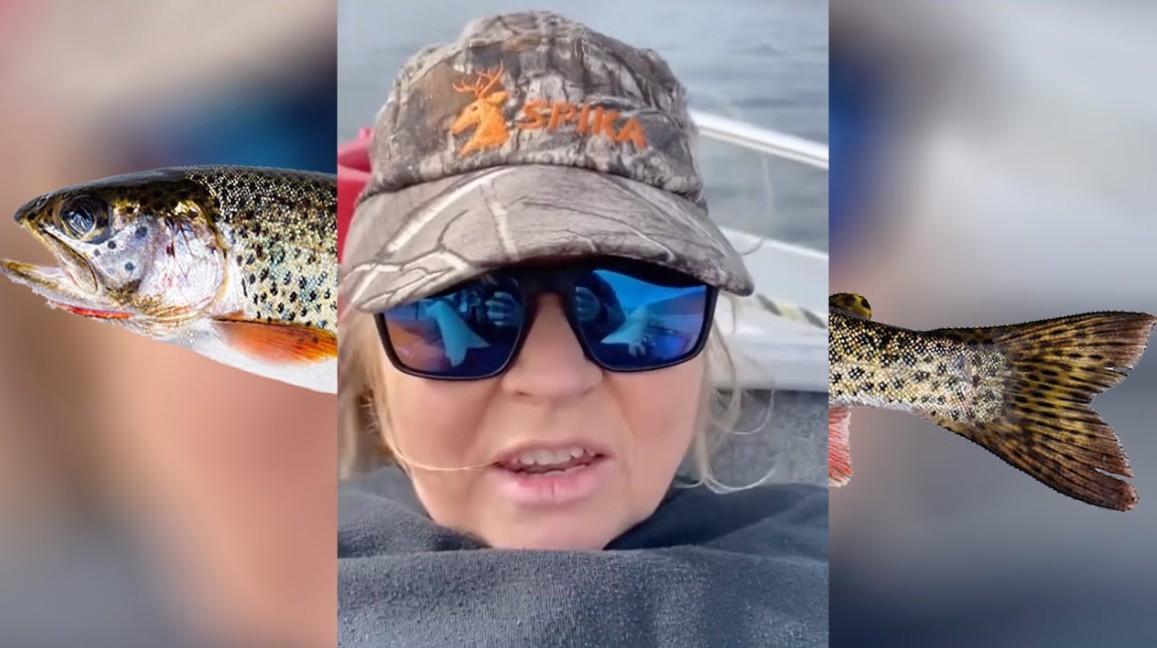Trout Lady Full Video on (X/Twitter) Reddit and Fallout
Catherine June Lee, a 58-year-old woman from southern Tasmania, has come under intense public scrutiny following her recent court appearance. The legal proceedings stem from a highly controversial incident that was widely circulated online in the so-called “trout lady” video. The footage allegedly depicts an act involving a live brown trout on a boat, sparking widespread outrage and serious legal consequences. Lee appeared at Hobart Magistrates Court on Monday, August 19, 2024, marking her first appearance since the video gained international attention.

The content of the video not only provoked public anger but also led to formal legal charges. Lee faces multiple counts under the Classification (Publications, Films and Computer Games) Enforcement Act, including one count of possessing a bestiality product between February 2022 and January 2023, and two counts of making or reproducing a bestiality product during the same period. This initial court hearing represents a preliminary step in a case that raises disturbing allegations and underscores the complex relationship between digital media distribution and criminal law.
The case has sparked debate over ethical boundaries and the responsibilities of individuals in managing and sharing digital content. As proceedings continue, the matter remains under intense legal and public scrutiny, reflecting broader societal concerns about the influence and reach of viral media.
Contents
The Story Behind the Disturbing Video
The controversy centers on a video that surfaced online showing an act performed with a live brown trout on a boat. The footage quickly went viral across social media platforms, transforming a local scandal into an international story. The video reportedly shows Lee on a boat while a man allegedly engages in behavior classified as bestiality. Its graphic nature prompted immediate public outrage and concern, drawing attention far beyond Tasmania.
Footage Trout Lady Full Video Exposed
trout-lady-full-video-no-blur.mp4
The rapid spread of the video highlights the power of digital platforms in amplifying content, particularly material that is shocking or disturbing. As the video circulated, public condemnation grew, with many calling for legal action against those involved. The incident serves as a stark example of how quickly digital media can escalate a local event into a global controversy with legal ramifications.
Charges and Legal Proceedings
In response to the viral video and ensuing public outcry, Catherine June Lee was formally charged under the Classification (Publications, Films and Computer Games) Enforcement Act. The charges include one count of possessing a bestiality product, relating to her access to the video between February 2022 and January 2023, and two counts of making or reproducing a bestiality product, indicating alleged involvement in the creation or distribution of the material.

During Lee’s court appearance, Magistrate Marica Duvnjak granted an adjournment to allow further investigation and preparation for trial. The next hearing is scheduled for October 2024, giving both the prosecution and defense time to collect evidence and prepare their cases. This pause also provides the legal system an opportunity to carefully navigate the complexities of the case.
The proceedings have sparked ongoing discussions about ethical behavior, digital content responsibilities, and the real-world impact of online material. Beyond addressing Lee’s specific actions, the case may set a precedent for how similar incidents involving viral media and criminal behavior are handled in the future.
Co-Accused Details
In the high-profile case that has captured public attention, Ashley David Hallam has been named as the co-accused alongside Catherine June Lee. Hallam, 55, also from Tasmania, has been implicated in the scandal surrounding the viral “trout video.” Authorities allege that his involvement was significant, and his legal challenges mirror the seriousness of the accusations facing Lee.
Hallam made his first court appearance earlier than Lee, attending a hearing in May 2024. During this session, the charges against him were formally presented, indicating his substantial involvement in the creation and distribution of the controversial video. Hallam faces two counts of making or reproducing a bestiality product and three counts of possessing a bestiality product. Comparatively, Lee faces one count fewer in each category, suggesting Hallam’s role in the production and possession of the illicit material may have been more extensive.
The distinction in charges points to possible differences in the nature and scope of each individual’s participation. As the case moves forward, these specifics are expected to become clearer, potentially influencing the severity of penalties if either is convicted.
Public and Legal Reaction
The release and viral spread of the video depicting an act with a live trout on a boat triggered immediate and widespread public outrage. Many viewers described the footage as deeply disturbing, and it quickly drew national and international attention. Social media platforms, public forums, and community discussions were flooded with shock and condemnation, with widespread calls for swift legal action.
In response, law enforcement agencies acted promptly, investigating the incident and charging the individuals involved. The rapid response underscored authorities’ concern about the role of digital media in disseminating illegal content and influencing public behavior.
Officials also issued warnings to the public, emphasizing that possessing or sharing such material constitutes a criminal offense. These statements aimed both to educate the community on legal boundaries and to deter others from engaging with illicit content.
The intense legal and public reactions highlight the broader societal issues surrounding digital content, morality, and accountability. The case has sparked debates on ethical standards in online interactions and the responsibilities individuals carry when creating, sharing, or consuming digital media.
Legal Framework
The charges against Lee and Hallam are grounded in the Classification (Publications, Films and Computer Games) Enforcement Act, a key piece of Australian legislation regulating the distribution and classification of media content. This law is designed to protect the public from exposure to material considered offensive, harmful, or morally objectionable, including explicit acts such as bestiality.
Under the Act, producing, possessing, or distributing bestiality-related content is a criminal offense. Enforcement involves assessing the material’s potential impact on viewers and ensuring it meets public decency standards.
In this case, the charges reflect the alleged roles of Lee and Hallam in producing and possessing a bestiality product. The seriousness of these charges underscores the Act’s strict stance against content that could corrupt public morals or promote harmful behavior. The ongoing legal proceedings illustrate the mechanisms in place to enforce these standards and the potential consequences of violations.
Broader Implications
The case of Catherine June Lee and Ashley David Hallam has drawn widespread attention due to the nature of the alleged offenses and the broader societal implications. The viral trout video not only sparked outrage but also triggered a significant legal response under the Classification Act.
Court proceedings for both accused individuals are critical, addressing personal culpability while emphasizing societal boundaries regarding acceptable content. Lee’s August 2024 court appearance and the adjournment until October reflect the legal system’s methodical approach to complex cases involving digital media and controversial material.
This case highlights ongoing challenges in the digital age, where the ease of content creation and distribution can clash with legal standards and social norms. Public reaction and legal action illustrate a community’s commitment to upholding moral standards and protecting public welfare.
As the case progresses, it continues to provoke discussion on digital media ethics, privacy, and acceptable behavior. Its outcome may influence future legal interpretations and shape public attitudes toward similar incidents, marking a significant moment in the evolving dialogue between law, society, and media.
Daily News -Sean Herman Video Sparks and Police Accountability
Katie Price Dubai Photo Draws Attention From Fans
Pan Piano Video Leak Causes Online Drama and Debate
Christine Chubbuck Video and the Media Decisions
Prison Officer Wandsworth Video Leak on Social Media
Georgie Cooper Video Leak and the Internet’s Reaction
Yes King Original Video Leads the Meme Culture Movement

